HI6027 Business & Corporate Law: Partnership & Agency Case Study
VerifiedAdded on 2023/03/30
|9
|1932
|361
Case Study
AI Summary
This assignment presents a comprehensive case study analyzing various aspects of business law, specifically focusing on partnership and agency. Part A delves into the intricacies of a partnership formed by Lucy, Seamus, and Koo (LuSeKo), examining issues such as the existence of a partnership, liability for business debts, breach of duty by a partner, the impact of a partner's death, and the determination of partnership property and losses. The analysis applies relevant sections of the Partnership Act 1963 to the facts of the case. Part B shifts focus to agency law, exploring the liability of Swimmingpool Co for the actions of its manager, Martin, who engaged in misconduct and planned to start a competing business. The discussion covers express and implied rights and obligations, vicarious liability, and fiduciary duties, referencing key legal precedents. The assignment concludes by determining the liabilities and responsibilities of the parties involved in both scenarios.
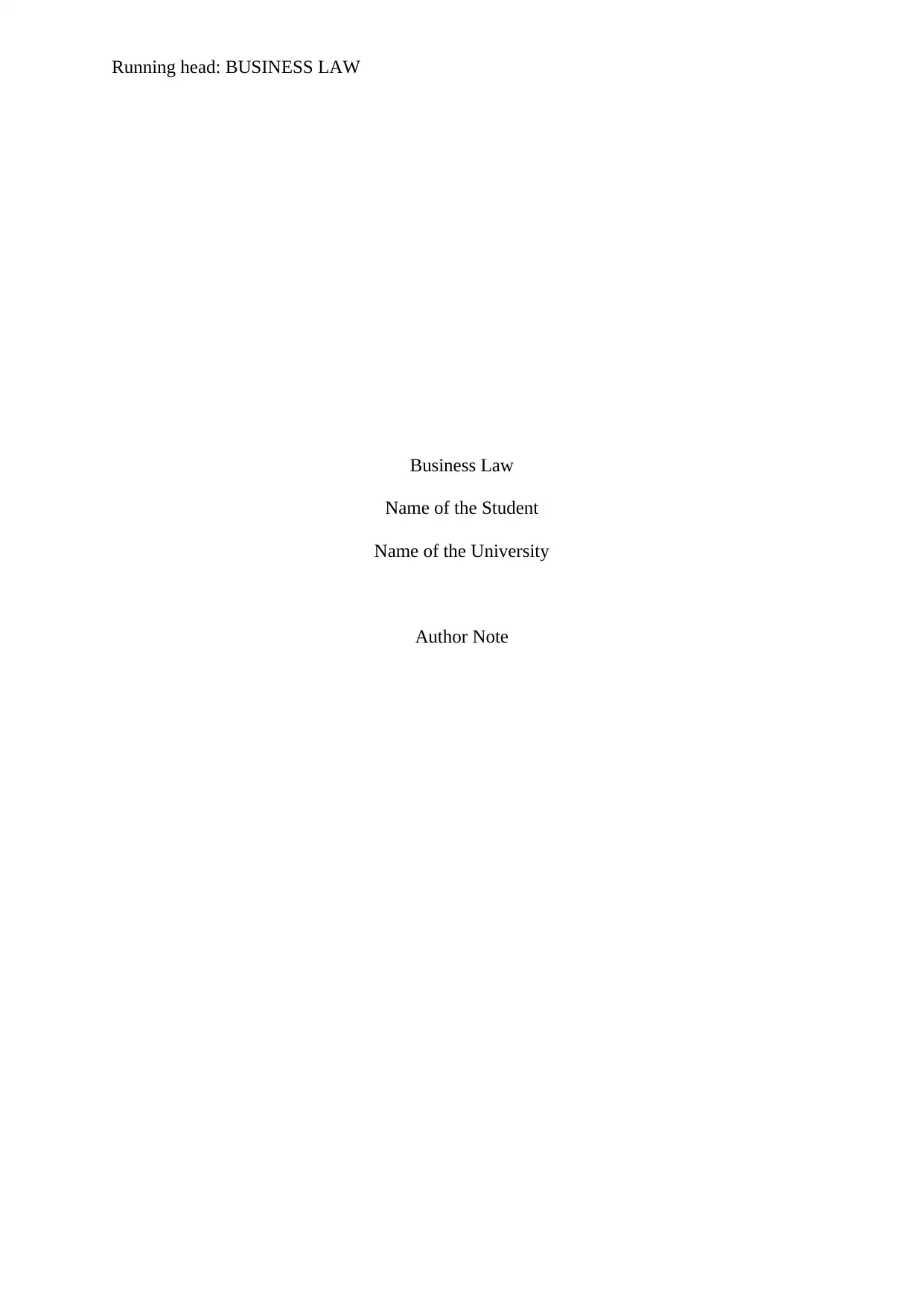
Running head: BUSINESS LAW
Business Law
Name of the Student
Name of the University
Author Note
Business Law
Name of the Student
Name of the University
Author Note
Paraphrase This Document
Need a fresh take? Get an instant paraphrase of this document with our AI Paraphraser
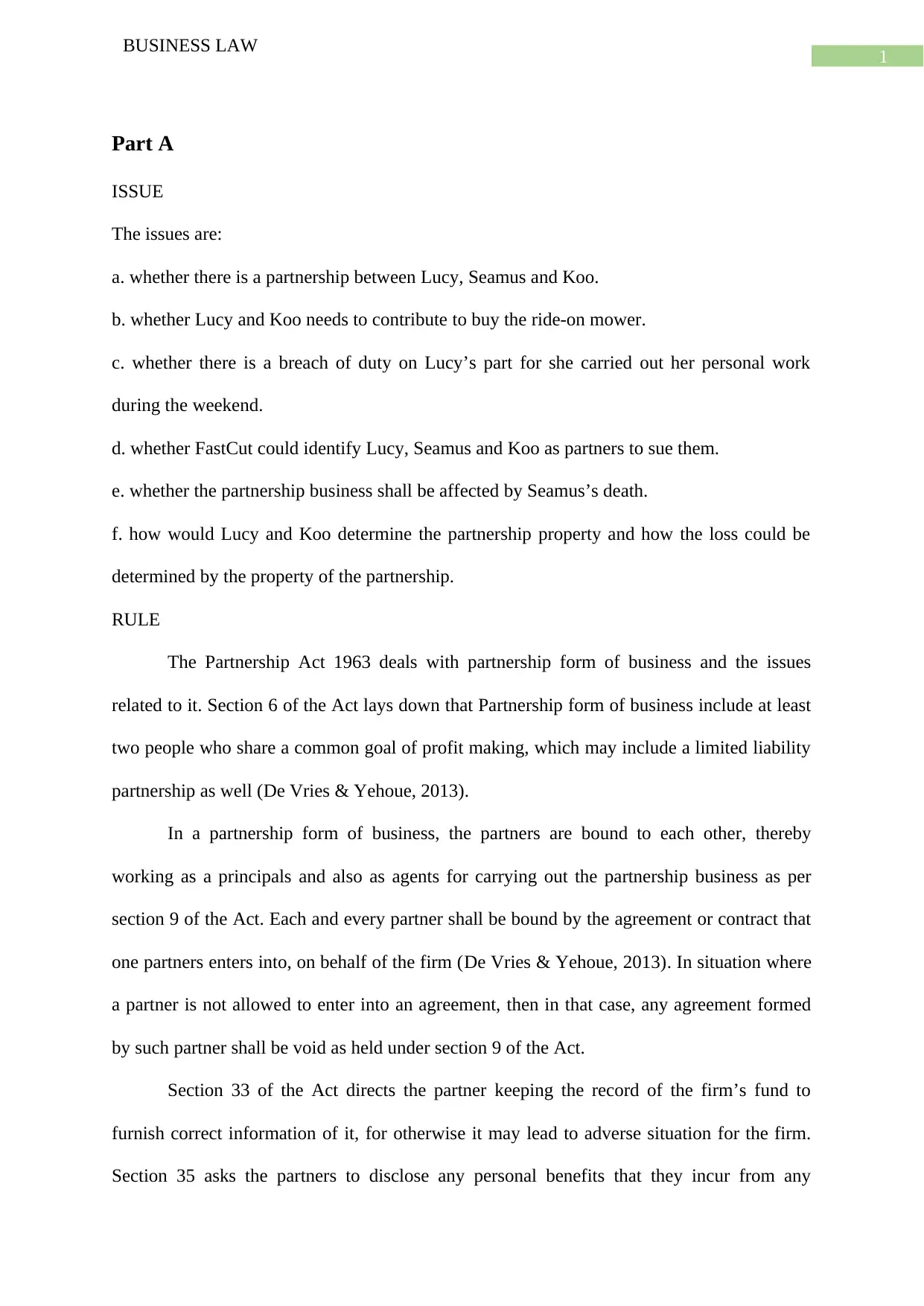
1
BUSINESS LAW
Part A
ISSUE
The issues are:
a. whether there is a partnership between Lucy, Seamus and Koo.
b. whether Lucy and Koo needs to contribute to buy the ride-on mower.
c. whether there is a breach of duty on Lucy’s part for she carried out her personal work
during the weekend.
d. whether FastCut could identify Lucy, Seamus and Koo as partners to sue them.
e. whether the partnership business shall be affected by Seamus’s death.
f. how would Lucy and Koo determine the partnership property and how the loss could be
determined by the property of the partnership.
RULE
The Partnership Act 1963 deals with partnership form of business and the issues
related to it. Section 6 of the Act lays down that Partnership form of business include at least
two people who share a common goal of profit making, which may include a limited liability
partnership as well (De Vries & Yehoue, 2013).
In a partnership form of business, the partners are bound to each other, thereby
working as a principals and also as agents for carrying out the partnership business as per
section 9 of the Act. Each and every partner shall be bound by the agreement or contract that
one partners enters into, on behalf of the firm (De Vries & Yehoue, 2013). In situation where
a partner is not allowed to enter into an agreement, then in that case, any agreement formed
by such partner shall be void as held under section 9 of the Act.
Section 33 of the Act directs the partner keeping the record of the firm’s fund to
furnish correct information of it, for otherwise it may lead to adverse situation for the firm.
Section 35 asks the partners to disclose any personal benefits that they incur from any
BUSINESS LAW
Part A
ISSUE
The issues are:
a. whether there is a partnership between Lucy, Seamus and Koo.
b. whether Lucy and Koo needs to contribute to buy the ride-on mower.
c. whether there is a breach of duty on Lucy’s part for she carried out her personal work
during the weekend.
d. whether FastCut could identify Lucy, Seamus and Koo as partners to sue them.
e. whether the partnership business shall be affected by Seamus’s death.
f. how would Lucy and Koo determine the partnership property and how the loss could be
determined by the property of the partnership.
RULE
The Partnership Act 1963 deals with partnership form of business and the issues
related to it. Section 6 of the Act lays down that Partnership form of business include at least
two people who share a common goal of profit making, which may include a limited liability
partnership as well (De Vries & Yehoue, 2013).
In a partnership form of business, the partners are bound to each other, thereby
working as a principals and also as agents for carrying out the partnership business as per
section 9 of the Act. Each and every partner shall be bound by the agreement or contract that
one partners enters into, on behalf of the firm (De Vries & Yehoue, 2013). In situation where
a partner is not allowed to enter into an agreement, then in that case, any agreement formed
by such partner shall be void as held under section 9 of the Act.
Section 33 of the Act directs the partner keeping the record of the firm’s fund to
furnish correct information of it, for otherwise it may lead to adverse situation for the firm.
Section 35 asks the partners to disclose any personal benefits that they incur from any
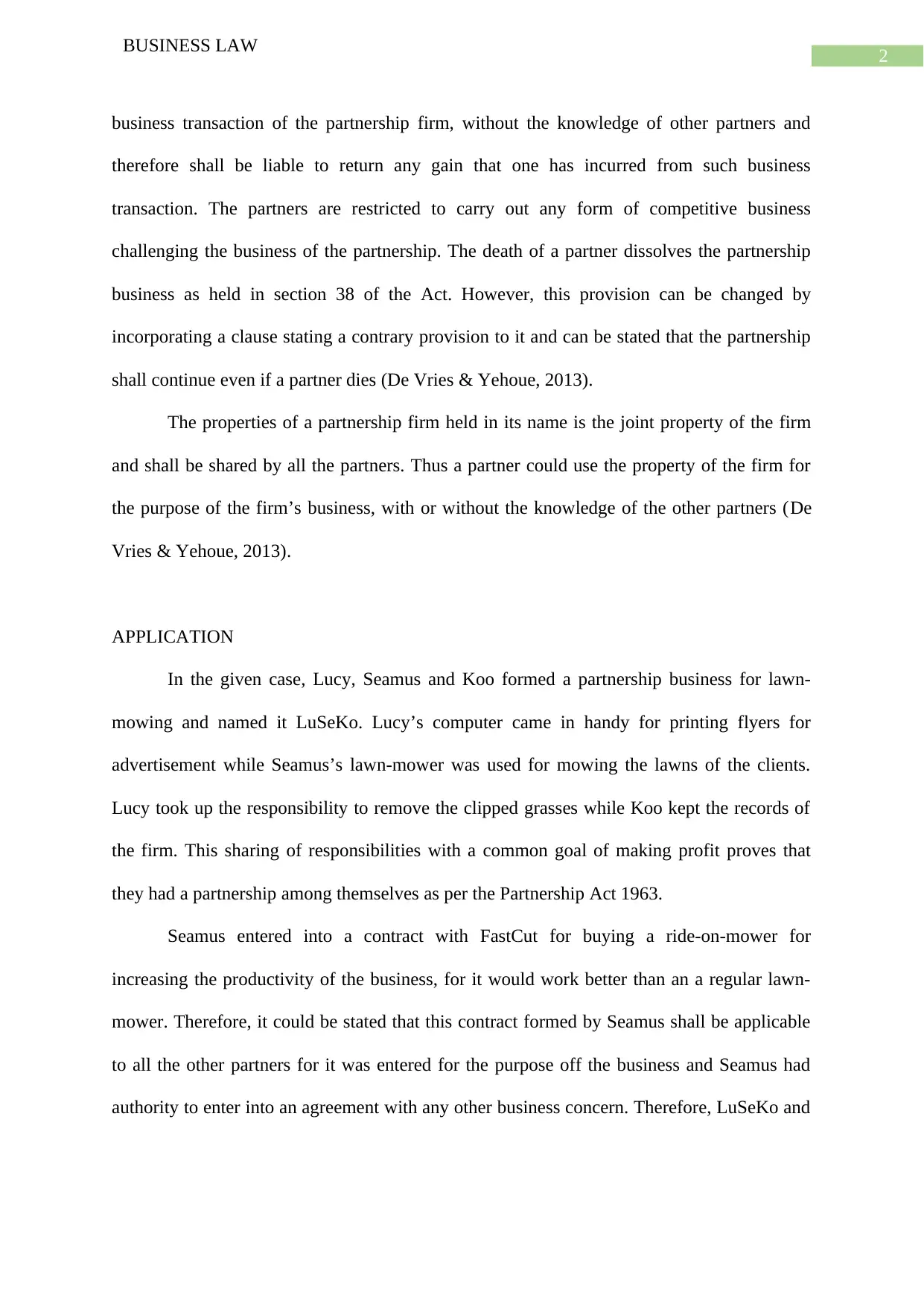
2
BUSINESS LAW
business transaction of the partnership firm, without the knowledge of other partners and
therefore shall be liable to return any gain that one has incurred from such business
transaction. The partners are restricted to carry out any form of competitive business
challenging the business of the partnership. The death of a partner dissolves the partnership
business as held in section 38 of the Act. However, this provision can be changed by
incorporating a clause stating a contrary provision to it and can be stated that the partnership
shall continue even if a partner dies (De Vries & Yehoue, 2013).
The properties of a partnership firm held in its name is the joint property of the firm
and shall be shared by all the partners. Thus a partner could use the property of the firm for
the purpose of the firm’s business, with or without the knowledge of the other partners (De
Vries & Yehoue, 2013).
APPLICATION
In the given case, Lucy, Seamus and Koo formed a partnership business for lawn-
mowing and named it LuSeKo. Lucy’s computer came in handy for printing flyers for
advertisement while Seamus’s lawn-mower was used for mowing the lawns of the clients.
Lucy took up the responsibility to remove the clipped grasses while Koo kept the records of
the firm. This sharing of responsibilities with a common goal of making profit proves that
they had a partnership among themselves as per the Partnership Act 1963.
Seamus entered into a contract with FastCut for buying a ride-on-mower for
increasing the productivity of the business, for it would work better than an a regular lawn-
mower. Therefore, it could be stated that this contract formed by Seamus shall be applicable
to all the other partners for it was entered for the purpose off the business and Seamus had
authority to enter into an agreement with any other business concern. Therefore, LuSeKo and
BUSINESS LAW
business transaction of the partnership firm, without the knowledge of other partners and
therefore shall be liable to return any gain that one has incurred from such business
transaction. The partners are restricted to carry out any form of competitive business
challenging the business of the partnership. The death of a partner dissolves the partnership
business as held in section 38 of the Act. However, this provision can be changed by
incorporating a clause stating a contrary provision to it and can be stated that the partnership
shall continue even if a partner dies (De Vries & Yehoue, 2013).
The properties of a partnership firm held in its name is the joint property of the firm
and shall be shared by all the partners. Thus a partner could use the property of the firm for
the purpose of the firm’s business, with or without the knowledge of the other partners (De
Vries & Yehoue, 2013).
APPLICATION
In the given case, Lucy, Seamus and Koo formed a partnership business for lawn-
mowing and named it LuSeKo. Lucy’s computer came in handy for printing flyers for
advertisement while Seamus’s lawn-mower was used for mowing the lawns of the clients.
Lucy took up the responsibility to remove the clipped grasses while Koo kept the records of
the firm. This sharing of responsibilities with a common goal of making profit proves that
they had a partnership among themselves as per the Partnership Act 1963.
Seamus entered into a contract with FastCut for buying a ride-on-mower for
increasing the productivity of the business, for it would work better than an a regular lawn-
mower. Therefore, it could be stated that this contract formed by Seamus shall be applicable
to all the other partners for it was entered for the purpose off the business and Seamus had
authority to enter into an agreement with any other business concern. Therefore, LuSeKo and
⊘ This is a preview!⊘
Do you want full access?
Subscribe today to unlock all pages.

Trusted by 1+ million students worldwide
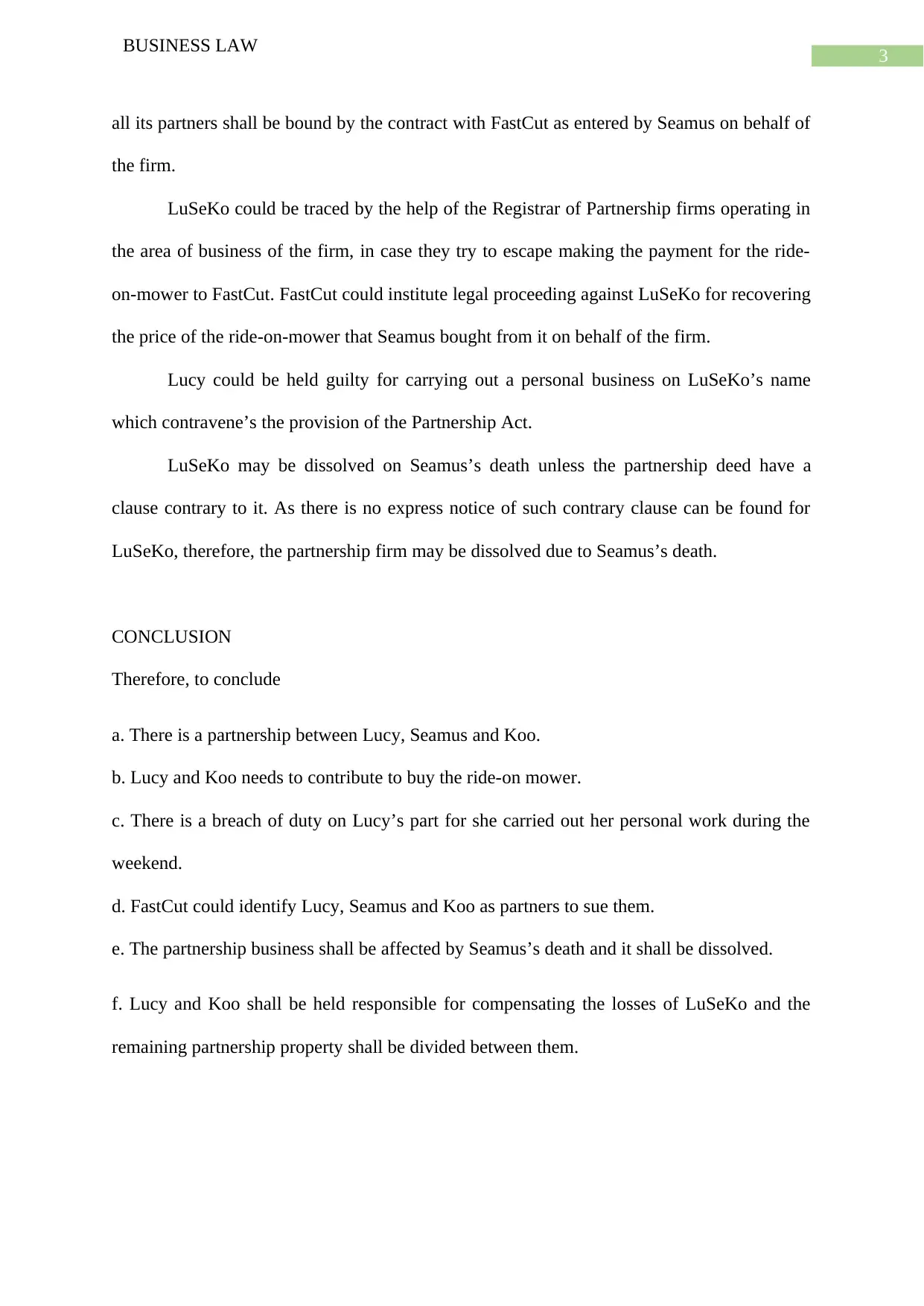
3
BUSINESS LAW
all its partners shall be bound by the contract with FastCut as entered by Seamus on behalf of
the firm.
LuSeKo could be traced by the help of the Registrar of Partnership firms operating in
the area of business of the firm, in case they try to escape making the payment for the ride-
on-mower to FastCut. FastCut could institute legal proceeding against LuSeKo for recovering
the price of the ride-on-mower that Seamus bought from it on behalf of the firm.
Lucy could be held guilty for carrying out a personal business on LuSeKo’s name
which contravene’s the provision of the Partnership Act.
LuSeKo may be dissolved on Seamus’s death unless the partnership deed have a
clause contrary to it. As there is no express notice of such contrary clause can be found for
LuSeKo, therefore, the partnership firm may be dissolved due to Seamus’s death.
CONCLUSION
Therefore, to conclude
a. There is a partnership between Lucy, Seamus and Koo.
b. Lucy and Koo needs to contribute to buy the ride-on mower.
c. There is a breach of duty on Lucy’s part for she carried out her personal work during the
weekend.
d. FastCut could identify Lucy, Seamus and Koo as partners to sue them.
e. The partnership business shall be affected by Seamus’s death and it shall be dissolved.
f. Lucy and Koo shall be held responsible for compensating the losses of LuSeKo and the
remaining partnership property shall be divided between them.
BUSINESS LAW
all its partners shall be bound by the contract with FastCut as entered by Seamus on behalf of
the firm.
LuSeKo could be traced by the help of the Registrar of Partnership firms operating in
the area of business of the firm, in case they try to escape making the payment for the ride-
on-mower to FastCut. FastCut could institute legal proceeding against LuSeKo for recovering
the price of the ride-on-mower that Seamus bought from it on behalf of the firm.
Lucy could be held guilty for carrying out a personal business on LuSeKo’s name
which contravene’s the provision of the Partnership Act.
LuSeKo may be dissolved on Seamus’s death unless the partnership deed have a
clause contrary to it. As there is no express notice of such contrary clause can be found for
LuSeKo, therefore, the partnership firm may be dissolved due to Seamus’s death.
CONCLUSION
Therefore, to conclude
a. There is a partnership between Lucy, Seamus and Koo.
b. Lucy and Koo needs to contribute to buy the ride-on mower.
c. There is a breach of duty on Lucy’s part for she carried out her personal work during the
weekend.
d. FastCut could identify Lucy, Seamus and Koo as partners to sue them.
e. The partnership business shall be affected by Seamus’s death and it shall be dissolved.
f. Lucy and Koo shall be held responsible for compensating the losses of LuSeKo and the
remaining partnership property shall be divided between them.
Paraphrase This Document
Need a fresh take? Get an instant paraphrase of this document with our AI Paraphraser
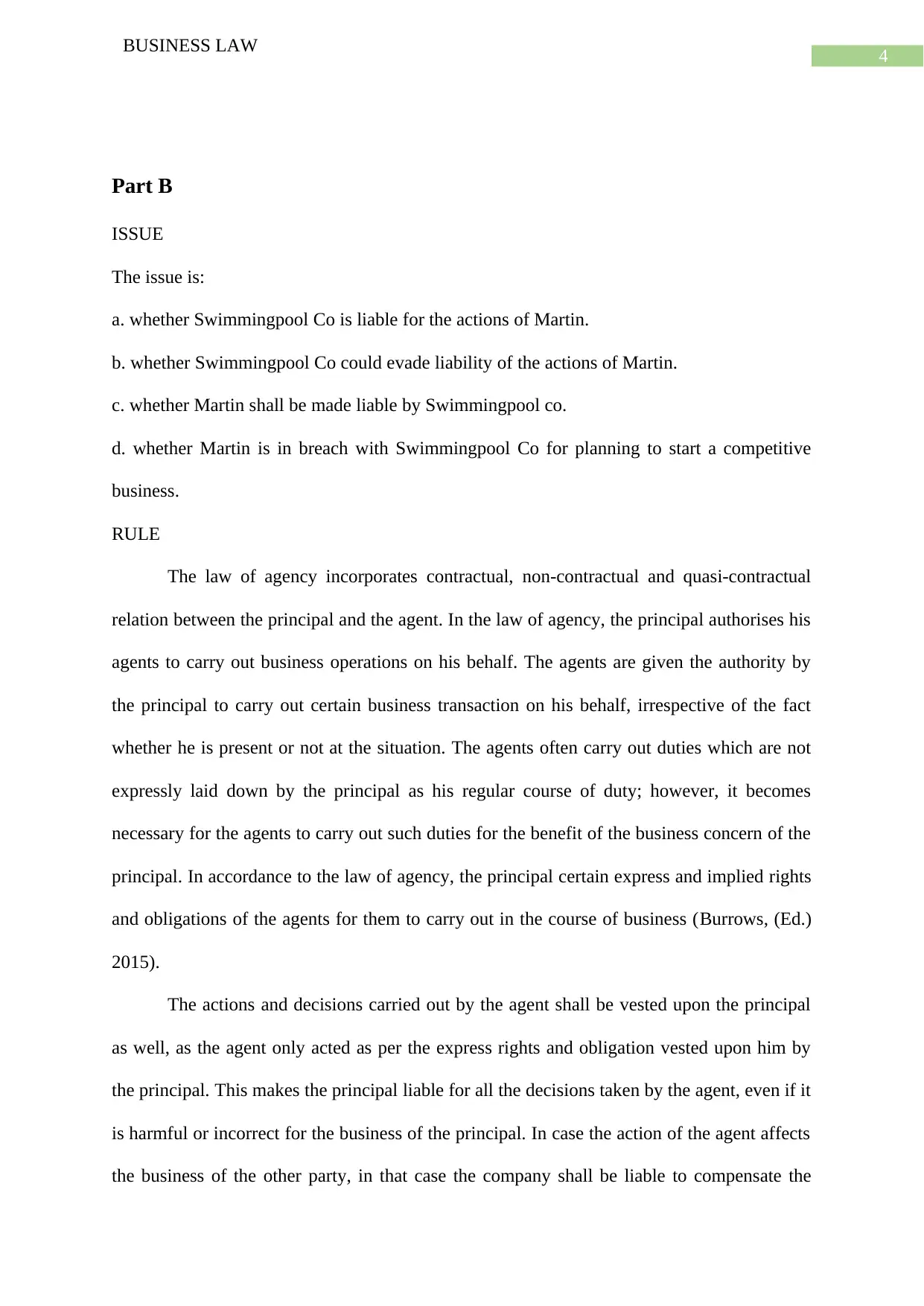
4
BUSINESS LAW
Part B
ISSUE
The issue is:
a. whether Swimmingpool Co is liable for the actions of Martin.
b. whether Swimmingpool Co could evade liability of the actions of Martin.
c. whether Martin shall be made liable by Swimmingpool co.
d. whether Martin is in breach with Swimmingpool Co for planning to start a competitive
business.
RULE
The law of agency incorporates contractual, non-contractual and quasi-contractual
relation between the principal and the agent. In the law of agency, the principal authorises his
agents to carry out business operations on his behalf. The agents are given the authority by
the principal to carry out certain business transaction on his behalf, irrespective of the fact
whether he is present or not at the situation. The agents often carry out duties which are not
expressly laid down by the principal as his regular course of duty; however, it becomes
necessary for the agents to carry out such duties for the benefit of the business concern of the
principal. In accordance to the law of agency, the principal certain express and implied rights
and obligations of the agents for them to carry out in the course of business (Burrows, (Ed.)
2015).
The actions and decisions carried out by the agent shall be vested upon the principal
as well, as the agent only acted as per the express rights and obligation vested upon him by
the principal. This makes the principal liable for all the decisions taken by the agent, even if it
is harmful or incorrect for the business of the principal. In case the action of the agent affects
the business of the other party, in that case the company shall be liable to compensate the
BUSINESS LAW
Part B
ISSUE
The issue is:
a. whether Swimmingpool Co is liable for the actions of Martin.
b. whether Swimmingpool Co could evade liability of the actions of Martin.
c. whether Martin shall be made liable by Swimmingpool co.
d. whether Martin is in breach with Swimmingpool Co for planning to start a competitive
business.
RULE
The law of agency incorporates contractual, non-contractual and quasi-contractual
relation between the principal and the agent. In the law of agency, the principal authorises his
agents to carry out business operations on his behalf. The agents are given the authority by
the principal to carry out certain business transaction on his behalf, irrespective of the fact
whether he is present or not at the situation. The agents often carry out duties which are not
expressly laid down by the principal as his regular course of duty; however, it becomes
necessary for the agents to carry out such duties for the benefit of the business concern of the
principal. In accordance to the law of agency, the principal certain express and implied rights
and obligations of the agents for them to carry out in the course of business (Burrows, (Ed.)
2015).
The actions and decisions carried out by the agent shall be vested upon the principal
as well, as the agent only acted as per the express rights and obligation vested upon him by
the principal. This makes the principal liable for all the decisions taken by the agent, even if it
is harmful or incorrect for the business of the principal. In case the action of the agent affects
the business of the other party, in that case the company shall be liable to compensate the
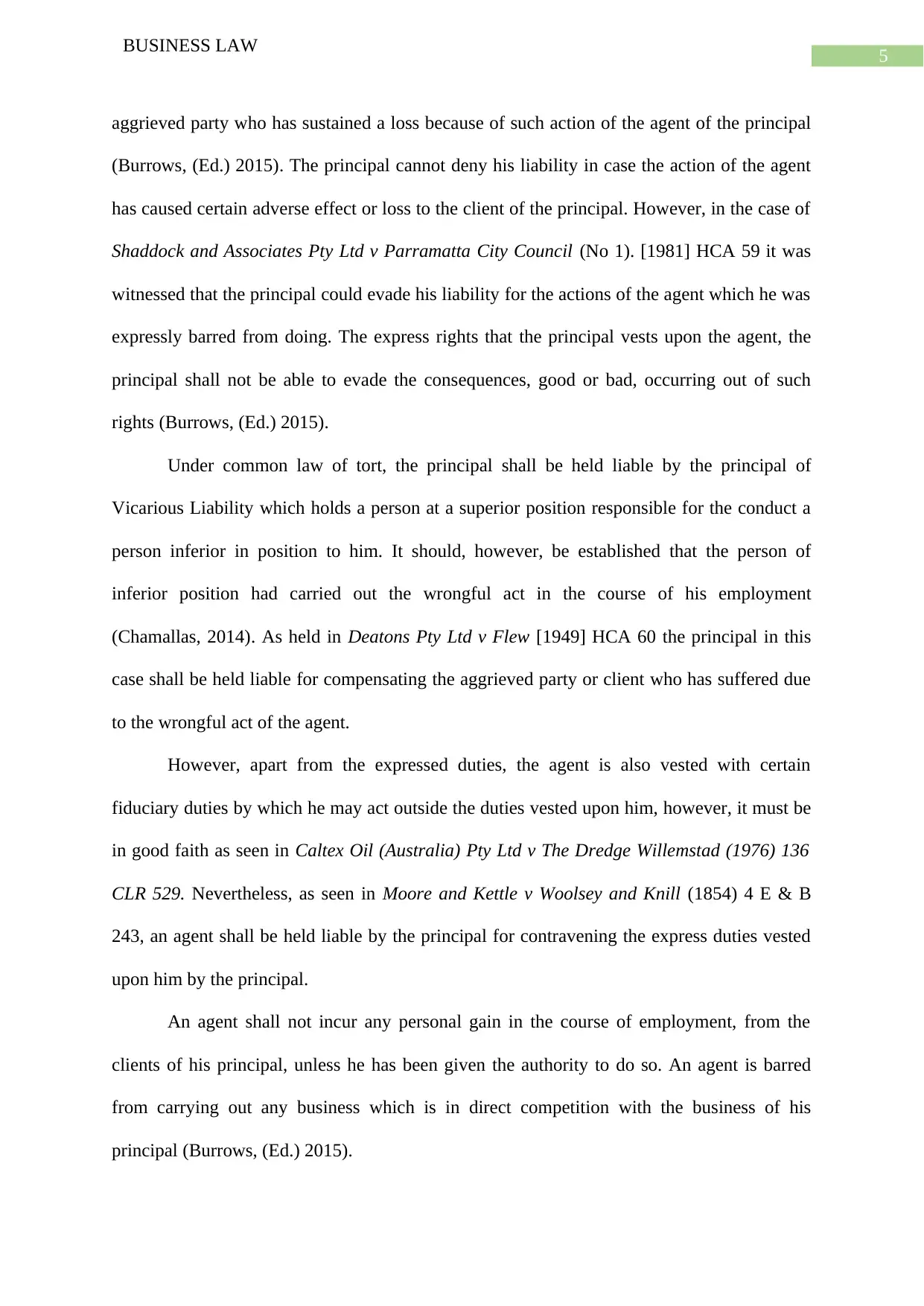
5
BUSINESS LAW
aggrieved party who has sustained a loss because of such action of the agent of the principal
(Burrows, (Ed.) 2015). The principal cannot deny his liability in case the action of the agent
has caused certain adverse effect or loss to the client of the principal. However, in the case of
Shaddock and Associates Pty Ltd v Parramatta City Council (No 1). [1981] HCA 59 it was
witnessed that the principal could evade his liability for the actions of the agent which he was
expressly barred from doing. The express rights that the principal vests upon the agent, the
principal shall not be able to evade the consequences, good or bad, occurring out of such
rights (Burrows, (Ed.) 2015).
Under common law of tort, the principal shall be held liable by the principal of
Vicarious Liability which holds a person at a superior position responsible for the conduct a
person inferior in position to him. It should, however, be established that the person of
inferior position had carried out the wrongful act in the course of his employment
(Chamallas, 2014). As held in Deatons Pty Ltd v Flew [1949] HCA 60 the principal in this
case shall be held liable for compensating the aggrieved party or client who has suffered due
to the wrongful act of the agent.
However, apart from the expressed duties, the agent is also vested with certain
fiduciary duties by which he may act outside the duties vested upon him, however, it must be
in good faith as seen in Caltex Oil (Australia) Pty Ltd v The Dredge Willemstad (1976) 136
CLR 529. Nevertheless, as seen in Moore and Kettle v Woolsey and Knill (1854) 4 E & B
243, an agent shall be held liable by the principal for contravening the express duties vested
upon him by the principal.
An agent shall not incur any personal gain in the course of employment, from the
clients of his principal, unless he has been given the authority to do so. An agent is barred
from carrying out any business which is in direct competition with the business of his
principal (Burrows, (Ed.) 2015).
BUSINESS LAW
aggrieved party who has sustained a loss because of such action of the agent of the principal
(Burrows, (Ed.) 2015). The principal cannot deny his liability in case the action of the agent
has caused certain adverse effect or loss to the client of the principal. However, in the case of
Shaddock and Associates Pty Ltd v Parramatta City Council (No 1). [1981] HCA 59 it was
witnessed that the principal could evade his liability for the actions of the agent which he was
expressly barred from doing. The express rights that the principal vests upon the agent, the
principal shall not be able to evade the consequences, good or bad, occurring out of such
rights (Burrows, (Ed.) 2015).
Under common law of tort, the principal shall be held liable by the principal of
Vicarious Liability which holds a person at a superior position responsible for the conduct a
person inferior in position to him. It should, however, be established that the person of
inferior position had carried out the wrongful act in the course of his employment
(Chamallas, 2014). As held in Deatons Pty Ltd v Flew [1949] HCA 60 the principal in this
case shall be held liable for compensating the aggrieved party or client who has suffered due
to the wrongful act of the agent.
However, apart from the expressed duties, the agent is also vested with certain
fiduciary duties by which he may act outside the duties vested upon him, however, it must be
in good faith as seen in Caltex Oil (Australia) Pty Ltd v The Dredge Willemstad (1976) 136
CLR 529. Nevertheless, as seen in Moore and Kettle v Woolsey and Knill (1854) 4 E & B
243, an agent shall be held liable by the principal for contravening the express duties vested
upon him by the principal.
An agent shall not incur any personal gain in the course of employment, from the
clients of his principal, unless he has been given the authority to do so. An agent is barred
from carrying out any business which is in direct competition with the business of his
principal (Burrows, (Ed.) 2015).
⊘ This is a preview!⊘
Do you want full access?
Subscribe today to unlock all pages.

Trusted by 1+ million students worldwide
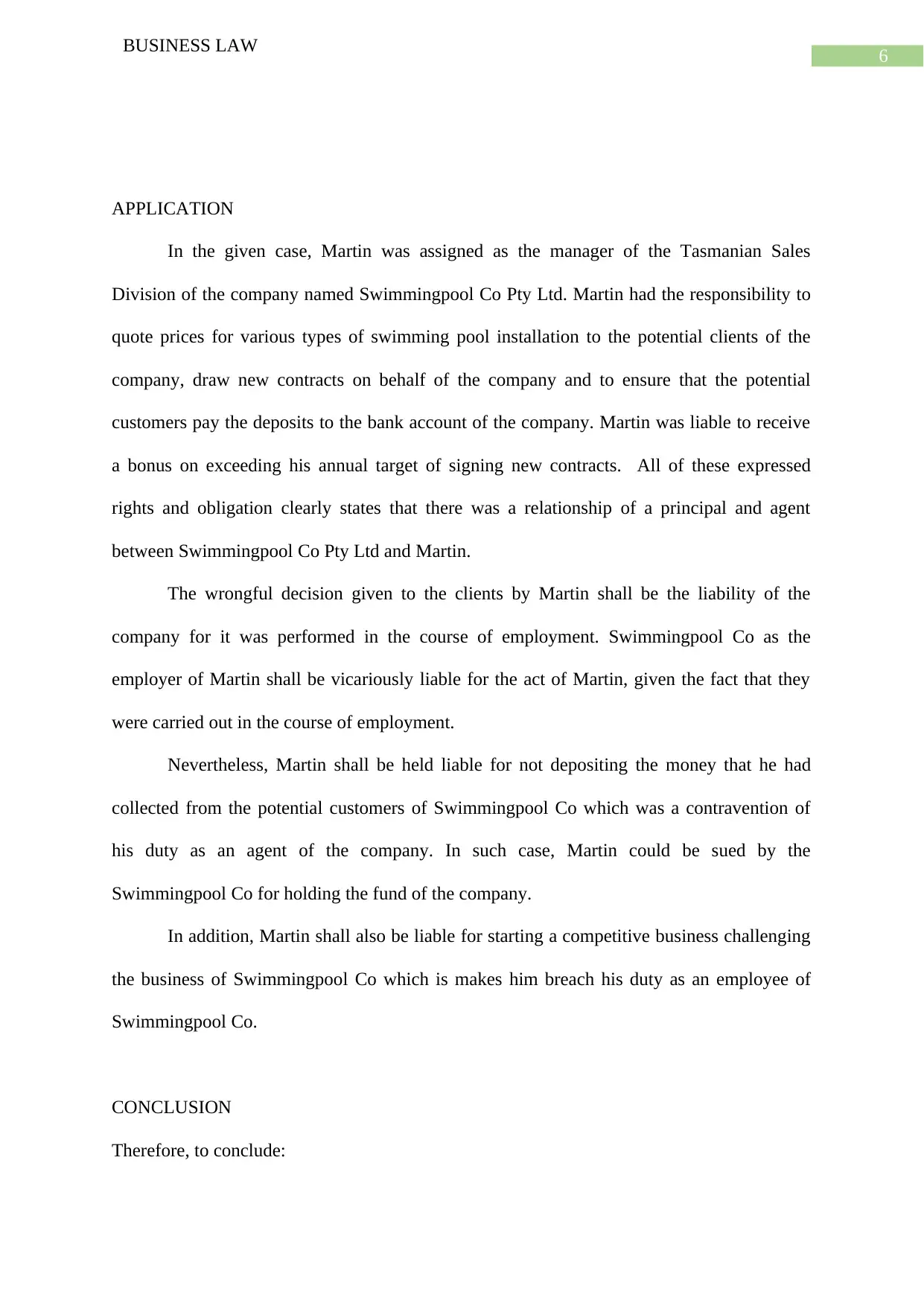
6
BUSINESS LAW
APPLICATION
In the given case, Martin was assigned as the manager of the Tasmanian Sales
Division of the company named Swimmingpool Co Pty Ltd. Martin had the responsibility to
quote prices for various types of swimming pool installation to the potential clients of the
company, draw new contracts on behalf of the company and to ensure that the potential
customers pay the deposits to the bank account of the company. Martin was liable to receive
a bonus on exceeding his annual target of signing new contracts. All of these expressed
rights and obligation clearly states that there was a relationship of a principal and agent
between Swimmingpool Co Pty Ltd and Martin.
The wrongful decision given to the clients by Martin shall be the liability of the
company for it was performed in the course of employment. Swimmingpool Co as the
employer of Martin shall be vicariously liable for the act of Martin, given the fact that they
were carried out in the course of employment.
Nevertheless, Martin shall be held liable for not depositing the money that he had
collected from the potential customers of Swimmingpool Co which was a contravention of
his duty as an agent of the company. In such case, Martin could be sued by the
Swimmingpool Co for holding the fund of the company.
In addition, Martin shall also be liable for starting a competitive business challenging
the business of Swimmingpool Co which is makes him breach his duty as an employee of
Swimmingpool Co.
CONCLUSION
Therefore, to conclude:
BUSINESS LAW
APPLICATION
In the given case, Martin was assigned as the manager of the Tasmanian Sales
Division of the company named Swimmingpool Co Pty Ltd. Martin had the responsibility to
quote prices for various types of swimming pool installation to the potential clients of the
company, draw new contracts on behalf of the company and to ensure that the potential
customers pay the deposits to the bank account of the company. Martin was liable to receive
a bonus on exceeding his annual target of signing new contracts. All of these expressed
rights and obligation clearly states that there was a relationship of a principal and agent
between Swimmingpool Co Pty Ltd and Martin.
The wrongful decision given to the clients by Martin shall be the liability of the
company for it was performed in the course of employment. Swimmingpool Co as the
employer of Martin shall be vicariously liable for the act of Martin, given the fact that they
were carried out in the course of employment.
Nevertheless, Martin shall be held liable for not depositing the money that he had
collected from the potential customers of Swimmingpool Co which was a contravention of
his duty as an agent of the company. In such case, Martin could be sued by the
Swimmingpool Co for holding the fund of the company.
In addition, Martin shall also be liable for starting a competitive business challenging
the business of Swimmingpool Co which is makes him breach his duty as an employee of
Swimmingpool Co.
CONCLUSION
Therefore, to conclude:
Paraphrase This Document
Need a fresh take? Get an instant paraphrase of this document with our AI Paraphraser
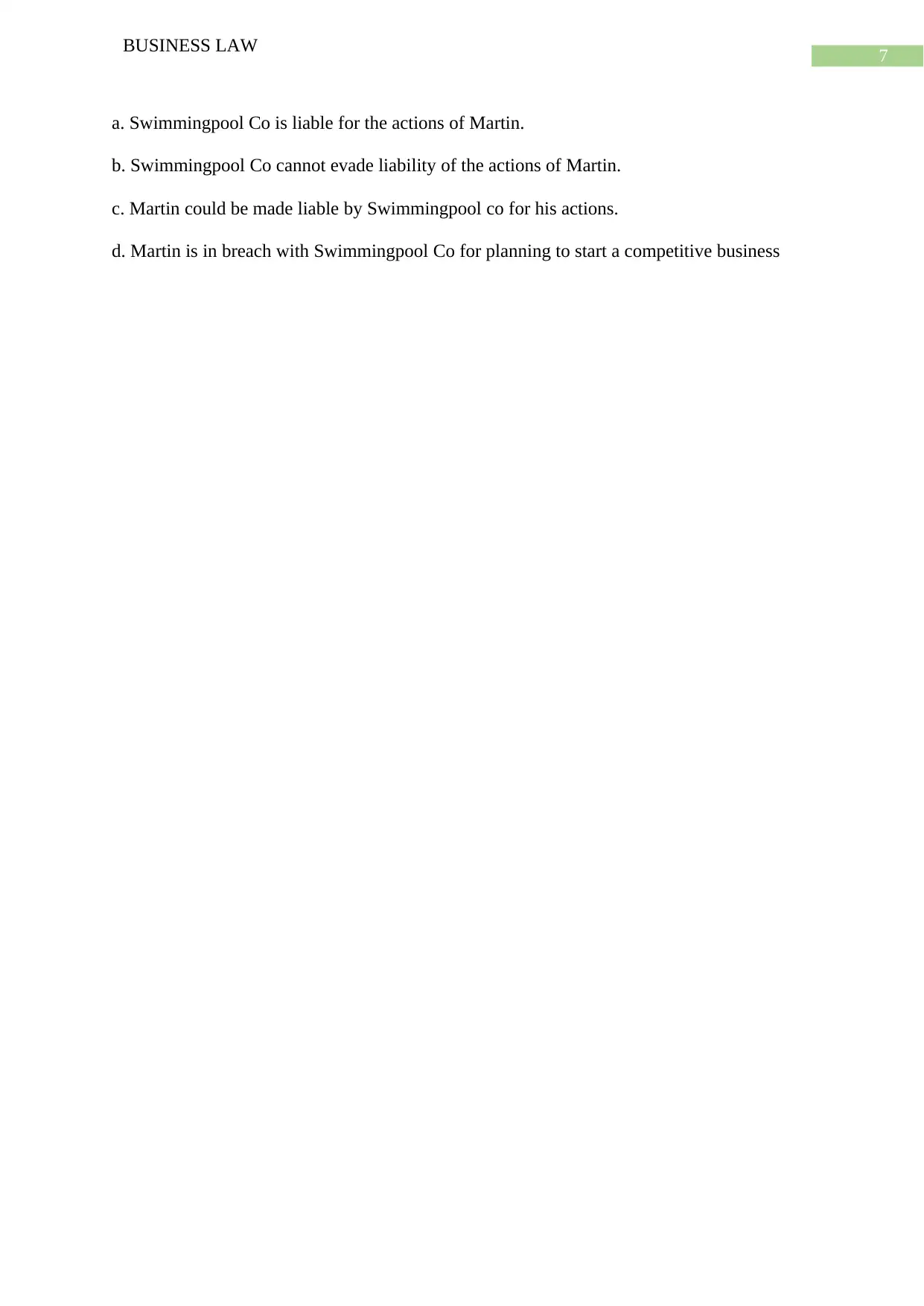
7
BUSINESS LAW
a. Swimmingpool Co is liable for the actions of Martin.
b. Swimmingpool Co cannot evade liability of the actions of Martin.
c. Martin could be made liable by Swimmingpool co for his actions.
d. Martin is in breach with Swimmingpool Co for planning to start a competitive business
BUSINESS LAW
a. Swimmingpool Co is liable for the actions of Martin.
b. Swimmingpool Co cannot evade liability of the actions of Martin.
c. Martin could be made liable by Swimmingpool co for his actions.
d. Martin is in breach with Swimmingpool Co for planning to start a competitive business
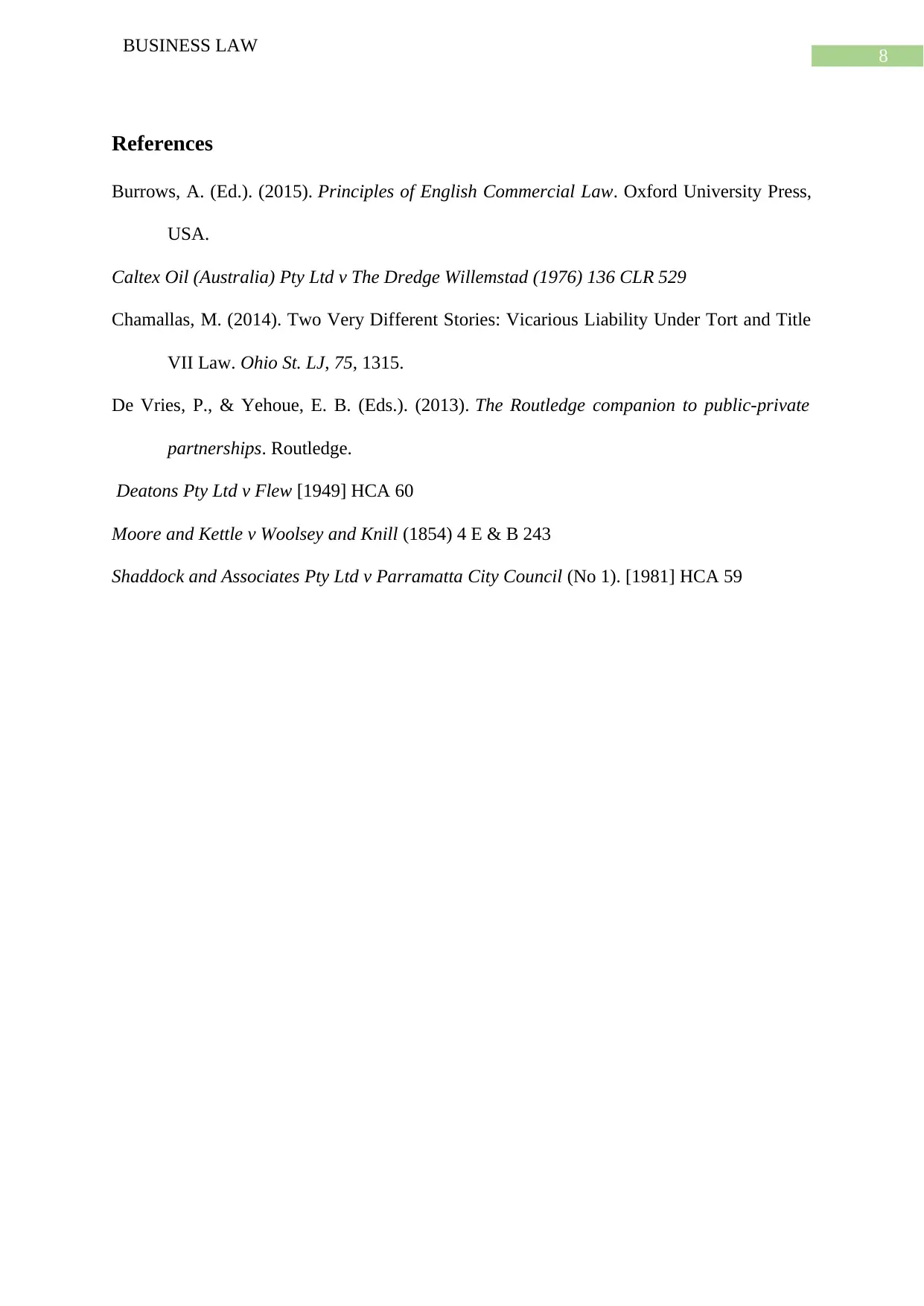
8
BUSINESS LAW
References
Burrows, A. (Ed.). (2015). Principles of English Commercial Law. Oxford University Press,
USA.
Caltex Oil (Australia) Pty Ltd v The Dredge Willemstad (1976) 136 CLR 529
Chamallas, M. (2014). Two Very Different Stories: Vicarious Liability Under Tort and Title
VII Law. Ohio St. LJ, 75, 1315.
De Vries, P., & Yehoue, E. B. (Eds.). (2013). The Routledge companion to public-private
partnerships. Routledge.
Deatons Pty Ltd v Flew [1949] HCA 60
Moore and Kettle v Woolsey and Knill (1854) 4 E & B 243
Shaddock and Associates Pty Ltd v Parramatta City Council (No 1). [1981] HCA 59
BUSINESS LAW
References
Burrows, A. (Ed.). (2015). Principles of English Commercial Law. Oxford University Press,
USA.
Caltex Oil (Australia) Pty Ltd v The Dredge Willemstad (1976) 136 CLR 529
Chamallas, M. (2014). Two Very Different Stories: Vicarious Liability Under Tort and Title
VII Law. Ohio St. LJ, 75, 1315.
De Vries, P., & Yehoue, E. B. (Eds.). (2013). The Routledge companion to public-private
partnerships. Routledge.
Deatons Pty Ltd v Flew [1949] HCA 60
Moore and Kettle v Woolsey and Knill (1854) 4 E & B 243
Shaddock and Associates Pty Ltd v Parramatta City Council (No 1). [1981] HCA 59
⊘ This is a preview!⊘
Do you want full access?
Subscribe today to unlock all pages.

Trusted by 1+ million students worldwide
1 out of 9
Related Documents
Your All-in-One AI-Powered Toolkit for Academic Success.
+13062052269
info@desklib.com
Available 24*7 on WhatsApp / Email
![[object Object]](/_next/static/media/star-bottom.7253800d.svg)
Unlock your academic potential
Copyright © 2020–2026 A2Z Services. All Rights Reserved. Developed and managed by ZUCOL.




